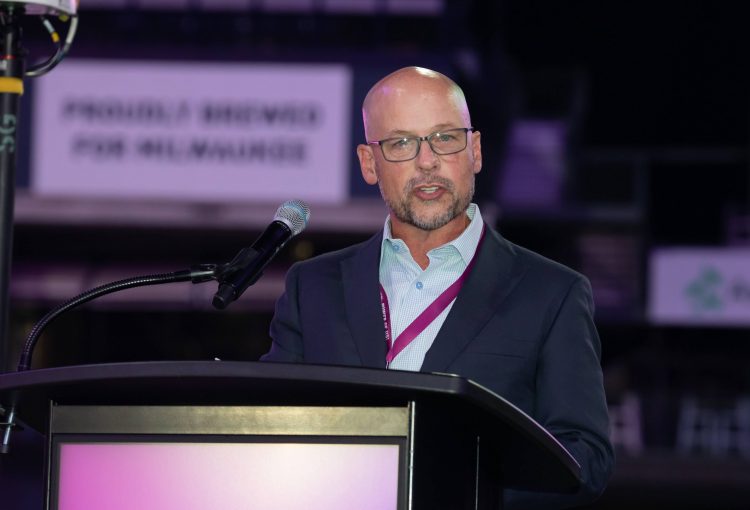JOHN PFEIFER: PANCREATIC CANCER SURVIVOR
Written By Julia Brabant
February 2024
Diagnosed: July 2021
Status: Response Has Been Remarkable
Estimates suggest that only about 20% of people with pancreatic cancer are eligible for surgery at the time of their diagnoses, and Wisconsin’s John Pfeifer was not among them. Yet, now, almost two years later, he’s fully recovered from an Appleby procedure, an operation used to treat some people with certain types of the condition. He’s also enjoying virtually the same lifestyle he did before his diagnosis while living cancer-free.
John found out he had pancreatic cancer in mid-2021 at age 55, when ongoing digestive pain prompted him to see his primary care provider. The doctor initially suspected an ulcer but wanted to explore all possibilities, ordering a series of blood tests that showed concerning liver enzyme numbers and sky-high bilirubin levels.
John’s doctor ordered a CT scan, revealing a mass on his pancreas. There was little history of cancer in his family and genetic testing didn’t indicate any predispositions, but a biopsy confirmed that the mass was, in fact, cancerous. Because the tumor had begun to grow around major blood vessels, doctors determined John was not currently a surgical candidate.
John’s medical team decided he should begin an aggressive chemotherapy regimen. He took heavy doses of FOLFIRINOX for about four months, taking infusions for up to 50 hours at a time. He also had periodic CT scans along the way to monitor progress.
“I’m going to tell you something I thought I’d never tell you,” John recalls his doctor, Dr. Douglas B. Evans, M.D., saying after reviewing his November 2021 scan at Froedtert & The Medical College of Wisconsin in Milwaukee, Wisconsin. “The chemo is working so well; you’re one of the best chemo responders I’ve ever seen.”
The news meant he may become eligible for surgery, after all.
“That was the first time I saw a potential light at the end of the tunnel,” John said. “I went from a terminal diagnosis to having hope.”
With John’s tumor shrinking and his liver enzyme numbers improving, Dr. Evans decided to move forward with an Appleby procedure. The highly complex surgery involves a distal pancreatectomy and splenectomy as well as the resection of the celiac artery.
The operation was long and arduous, but it went well, with Dr. Evans expressing confidence he was able to successfully remove all of John’s tumor. John stayed at the hospital for a week before returning home, where the pain proved so severe, he couldn’t sleep for more than an hour at a time and found himself pacing the house well into the night. John tried everything he could to exhaust himself and improve his sleep patterns, but the problem persisted for several more weeks, until it was time to try something else.
“I decided to go back to work,” he said. “I was tired of sitting around thinking about pain all day.”
For John, going back to work did exactly what he’d hoped it would – it took his mind off of his constant pain and gave him something other than his health to focus on. His wife, Eileen, also noted the change, remarking how much of a difference she saw in John within a week of his return to the office.
John says that having cancer gave him clarity about the purpose work serves in his life, reclarifying what’s truly important on both professional and personal levels.
“It allows you to be clearer about your priorities in life,” John said. “I appreciate little things now; like a sip of coffee at 5:00 a.m. in the morning. Two years ago, I never would have thought twice about that. I also enjoy little things about people I didn’t used to appreciate – you stop taking things for granted.”
Adjusting to life after pancreatic cancer – and an Appleby surgery – also involves making some diet and lifestyle changes. But now, almost two years out, John says he’s able to eat fairly normally. He says he has a healthy appetite, a “problem” he’s grateful to have. He’s also exercising like he did before his diagnosis, skiing when he can and running five or six days a week.
“Miraculously, nearly two years out, I’m no different in terms of what I can do now than before I had cancer,” he said.
John knows that makes him incredibly lucky. He also considers himself lucky to have received care from Dr. Evans and his entire team at Froedtert & MCW.
“They treat you like a person,” John said while addressing the crowd of pancreatic cancer physicians, researchers, patients and caregivers at Power of Us, the Seena Magowitz Foundation’s 2022 fundraiser for pancreatic cancer research. “Not like a number of a case study.”
John is also more appreciative of his wife and three adult children and the time he now gets to spend with them. He notes that he and Eileen had made a conscious decision to seek out the best possible medical care they could find after his diagnosis, and it’s one of three things he credits the most for his success. The second was surrounding himself with family and other positive people who’d keep his spirits up, and the third was making the decision to win the mental war against cancer.
“I decided I wasn’t going to complain that I had cancer – that would be turning myself into a victim,” John said. “I told myself, everybody in life has adversity – everybody. Some worse than others. But even with this cancer, I’ve still had less adversity than so many people in the world.”
John encourages other people facing pancreatic cancer to focus on gratitude and to try to view bumps in the road as life adversity.
“Sometimes, you get news that’s bad – I certainly did in the first couple of months,” he said. “But never lose hope. There’s always something they can do.”
John has been living cancer-free since his surgery in mid-March 2022.



